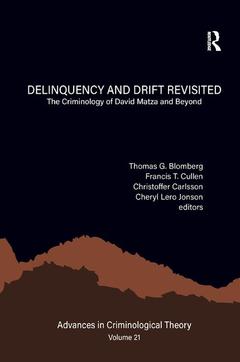Delinquency and Drift Revisited, Volume 21 The Criminology of David Matza and Beyond Advances in Criminological Theory Series
Coordonnateurs : Blomberg Thomas G., Cullen Francis T., Carlsson Christoffer, Jonson Cheryl Lero

Fifty years ago, David Matza wrote Delinquency and Drift, challenging the ways people thought about the development of criminals. Today, Delinquency and Drift Revisited reminds criminologists that they ignore Matza?s writings at their own intellectual peril.
Matza?s work shows his insights on a range of core criminological issues, such as: the complex nature of culture and its connection to criminality; the extent to which rule-breakers are truly different from the "rest of us"; the importance of focusing on human agency in understanding the subjective side of offending; the interaction of propensity and peer influences in criminal involvement; the role of the state in signifying individuals as deviant and entrapping them in criminal roles; and the processes that lead offenders to desist from crime.
This volume was not written to pay homage to Matza, but to show how his ideas remain relevant to criminology today by continuing to question conventional wisdom, by making us pay attention to realities we have overlooked, and by inspiring us to theorize more innovatively.
Contents
Preface
Part I. Origins
1. David Matza—Criminologist: With New Reflections from David Matza
Thomas G. Blomberg
2. Delinquency and Drift: Challenging Criminology Then and Now
Travis C. Pratt
Part II. Techniques of Neutralization
3. Techniques of Neutralization [reprint]
Gresham M. Sykes and David Matza
4. The Current Status of Neutralization Theory
Shadd Maruna and Heith Copes
Part III. Subterranean Values
5. Juvenile Delinquency and Subterranean Values [reprint]
David Matza and Gresham M. Sykes
6. Juvenile Delinquency and Subterranean Values Revisited
Timothy Brezina and Robert Agnew
7. White-Collar Crime and Subterranean Values
Michael L. Benson and Francis T. Cullen
Part IV. Delinquency and Drift
8. Cognitions and Crime: Matza’s Ideas in Classic and Contemporary Context
Peggy C. Giordano and Jennifer Copp
9. Drifting Out of Crime: Criminal Careers, Maturational Reform, and Desistance
Christoffer Carlsson
Part V. Becoming Deviant
10. Revisiting Matza’s Concepts of Affinity and Affiliation:
Lessons for the Study of Peer Influences in Criminology
Jean Marie McGloin and Kyle J. Thomas
11. Signification: The State as a Source of Crime
Daniel P. Mears and Cheryl Lero Jonson
Thomas G. Blomberg is Dean and Sheldon L. Messinger Professor of Criminology and Executive Director of the Center for Criminology and Public Policy in the College of Criminology and Criminal Justice at Florida State University.
Francis T. Cullen is Distinguished Research Professor Emeritus and Senior Research Associate in the School of Criminal Justice at the University of Cincinnati.
Christoffer Carlsson has a PhD in criminology from Stockholm University, Sweden, and is a researcher in criminology at The Institute for Futures Studies in Stockholm.
Cheryl Lero Jonson is an Assistant Professor in the Department of Criminal Justice at Xavier University.
Date de parution : 05-2019
15.2x22.9 cm
Date de parution : 08-2017
15.2x22.9 cm
Thèmes de Delinquency and Drift Revisited, Volume 21 :
Mots-clés :
Delinquency; Subterranean Values; subterranean; Delinquent; values; Matza’s Work; matzas; Maturational Reform; work; Delinquent Behavior; david; Young Men; matza; Vice Versa; juvenile; Violate; Matza's View; maturational; Desistance Processes; reform; Dominant Normative System; Travis C; Pratt; Delinquent Subcultures; Gresham M; Sykes; White Collar Offenders; David Matza; Institutional Anomie Theory; Shadd Maruna; Soft Determinism; Heith Copes; Dominant Social Order; Timothy Brezina; Juvenile Delinquency And Subterranean Values; Robert Agnew; White Collar Crime; Michael L; Benson; Delinquent Drift; Francis T; Cullen; Peer Influence Processes; Peggy C; Giordano; Positive Criminology; Jennifer Copp; Neutralization Acceptance; Christoffer Carlsson; Animal Kingdom; Jean Marie McGloin; Matza’s Theorizing; Kyle J; Thomas; Daniel P; Mears; Cheryl Lero Jonson



